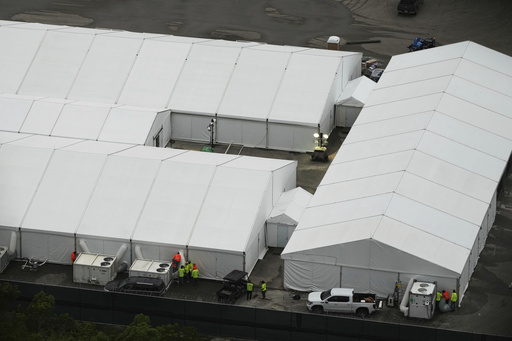MIAMI — In an initial hearing on Wednesday, government attorneys contended that a legal dispute regarding a quickly established immigration detention center in the Florida Everglades was inaccurately filed in an unsuitable venue. This case, known as “Alligator Alcatraz,” is under scrutiny due to a lawsuit brought by environmental advocates. Although the land is situated in Miami-Dade County, government lawyers argued that the litigation should not be pursued in Florida’s southern district, given that the facility itself resides in Collier County, part of Florida’s middle district.
Jesse Panuccio, representing the state, asserted in Miami’s federal court that “Everything is happening outside the southern district, either Collier County, Tallahassee, or the District of Columbia.” Paul’s Schwiep, representing Friends of the Everglades, concurred that numerous districts could have been fitting for the lawsuit. However, he highlighted the potential implications the temporary center poses on Miami-Dade County, especially concerning local cities, ecosystems, and water supply. Thus, the southern district, in his view, remains applicable.
Schwiep furthermore noted that the state’s objection surfaced only after a change in the appointment of the judge presiding over the case. Initially handled by a judge nominated by President George W. Bush, it was transferred this month to U.S. District Judge Kathleen Williams. Governor Ron DeSantis and other Republican figures have criticized Williams as an “activist judge,” particularly following her contempt ruling against Florida Attorney General James Uthmeier in an unrelated matter.
Panuccio firmly rejected any allegations of “judge-shopping,” emphasizing that the state intends to request venue changes for any related cases filed in the southern district. As of Wednesday, Judge Williams withheld her decision on the venue dispute. Her ruling could potentially sway an affiliated civil rights lawsuit alleging detainees at the site have been deprived of access to legal representation and immigration proceedings.
In this related civil rights case, defendants also challenge the lawsuit’s venue. Upon a judge’s suggestion, civil rights groups recently filed a revised class-action complaint, asserting that detainees’ constitutional rights are being infringed upon. They stated there’s an absence of clear policies or procedures for detainees to obtain legal counsel. “Defendants have wholly failed to develop any policy or process for detainees to access legal counsel at the facility,” the new filing claims. “Attorneys have been unable to discover any working process for setting up calls, via phone or video, with their clients or prospective clients.”
Last month, environmental groups pursued legal action against both federal and state officials within Florida’s southern district, aiming to halt the detention center’s construction, which is taking place on a former airstrip within the Everglades. This project is contested due to alleged non-compliance with statutory environmental laws. Apart from this week’s venue-focused hearing, another session is slated for the following week to deliberate on the request for a temporary injunction by environmental entities.
The facility, which has begun operations, hosts hundreds of detainees, with the capacity for 3,000. Florida officials have launched the center, though ambiguity remains regarding whether state or federal immigration authorities are in control. Dubbed “Alligator Alcatraz” by state officials, the nickname underscores its isolated nature, akin to the defunct island prison near San Francisco. An emergency evacuation plan released this week refers to the center as the South Florida Detention Facility, indicating its potential year-long or more operation.
Deportation flights from the detention center commenced last week. On Monday, Judge Williams demanded transparency concerning any agreements between the U.S. Department of Homeland Security and the Florida Department of Emergency Management. This could clarify the agency dynamics in running the facility.
While critics have denounced the center for its perceived harshness and environmental risk to sensitive Everglade wetlands, Gov. Ron DeSantis and other Republican leaders defend it as a component of Florida’s vigorous endorsement of former President Donald Trump’s initiatives against illegal immigration.


